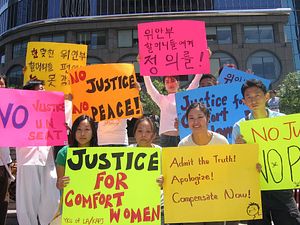Right-wing Japanese are up in arms at comments made by beauty queen Ikumi Yoshimatsu, after she spoke about comfort women on America’s CBS radio.
On March 29, Yoshimastu joined Robin Morgan, the American author and feminist, for the second time on her CBS radio show. In a determined tone, the 26-year-old Japanese activist spoke in English with carefully chosen phrases.
At the beginning of the interview, Yoshimatsu quoted Japanese Prime Minister Shinzo Abe’s speech at the General Assembly of the United Nations, last year. Abe pledged to “create a society in which women shine.”
Yoshimatsu went on to speak favorably of the prime minister for his efforts to help improve the situation for Japanese women in the workplace. She referred to the first lady, Akie Abe as the biggest supporter of her campaign, “Stalker Zero.”
In December 2013, Yoshimatsu spoke out about “the dark side of Japan’s entertainment industry” at Tokyo’s Foreign Correspondents’ Club of Japan. She alleged she had been stalked and threatened by a Japanese talent agency with links to the Japanese mob.
This January, Yoshimatsu launched her campaign to “end the ‘culture of silence’ towards crimes against women.” The petition ended up attracting 131,398 signatures. Japan’s first lady joined Yoshimatsu in an interview on this topic in February.
Yoko Ono also signed the petition, according to its Japanese website.
Immediately after Yoshimatsu proudly mentioned her friendship with the first lady, Morgan brought up the Kono Statement, asking whether Yoshimatsu thinks Mrs. Abe had played a part in the prime minister’s decision to backtrack on plans to reconsider the nation’s apology to comfort women.
“Yes, I think so.” Yoshimatsu answered, adding that some right-wing Japanese had claimed that the comfort women were common prostitutes and were therefore not owed an apology.
“As a Japanese, I am embarrassed and ashamed,” she said. “As a woman, I’m outraged that apologizing was even a issue.”
Once this comment was translated, Japanese netizens erupted on blogs and Yoshimatsu’s public Facebook page. In stark contrast to the support her stalker campaign attracted, this time she found herself branded a “traitor” and an “ignorant beauty queen.”
“This is sneaky propaganda to discount Japan,” one user said on her campaign page.
Responding to the criticism, Yoshimatsu posted an apology on her blog and Facebook page for any misunderstanding caused by translation. “It’s great to be opinionated and thank you for your advice.”
“I wish people would just let it go. They are not talking about the real issue. They are merely playing around it for political reasons,” one Japanese college student told The Diplomat.
Korean netizens, on the other hand, have been supportive, praising Yoshimatsu for holding fast in the face of the criticism.

































